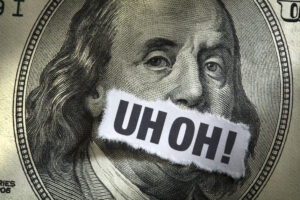Charges Against Alleged Architects Of $250M COVID-19 Relief Scheme Are A Big Warning To Others
For some of those wrongfully taking COVID-19 relief funds, the chickens are finally coming home to roost.
 Before the COVID-19 pandemic, no living person had been through a health crisis of that magnitude during their adult lives. Meeting the moment required innovation, perseverance, and grit.
Before the COVID-19 pandemic, no living person had been through a health crisis of that magnitude during their adult lives. Meeting the moment required innovation, perseverance, and grit.
It also required trillions — that’s trillions with a “t” — of dollars. In tandem with the waves of death and illness sweeping the nation and the world came unprecedented economic impacts. Businesses were forced to limit operations with each new coronavirus surge.
It is difficult to pin down exactly how much money the U.S. government has spent on COVID-19 relief measures to date, since a good deal of the money allocated for this purpose is spent slowly over time. However, Congress did approve almost $6 trillion in spending through a series of COVID-19 relief packages, and at least two-thirds of that money has already been disbursed.

The Business Case For AI At Your Law Firm

The relief money went toward (among other things) stimulus checks for average Americans; beefed up unemployment benefits; state, city, and local aid; child care and nutrition assistance; propping up the airlines; housing; small businesses; and, of course, healthcare spending. Government spending is always a bit of a leaky bucket. With that much of it all at once, almost no one expected a complete lack of fraud and abuse.
Now, for some of those wrongfully taking COVID-19 relief funds, the chickens are finally coming home to roost. On September 20, the Department of Justice announced federal criminal charges against 47 defendants for their roles in allegedly misappropriating $250 million in federal funds meant to pay for children’s nutritional needs during the pandemic.
According to indictments in the case, Aimee Bock, the founder and executive director of the nonprofit organization Feeding Our Future, oversaw a massive scheme to defraud taxpayers. The charges indicate that Feeding Our Future employees recruited individuals and entities to create Federal Child Nutrition Program sites across the state of Minnesota during a time of lax oversight as the government sought to ramp up operations quickly. Such sites were meant to serve food to children. Operators claimed to be serving meals to thousands of children every day, often within just days or weeks of opening. According to prosecutors, there were no hungry children getting fed, only a tangled web of shell companies, falsified forms, and money laundering fronts.
While it wouldn’t be unusual for many types of nonprofits to be handling somewhat more federal funds than normal in the wake of pandemic spending measures, the numbers do not look good for the defendants in this case. Feeding Our Future received and distributed about $3.4 million in federal funds in 2019. In 2021, that increased to $200 million — had this money actually been spent on children’s meals, it would have gone a long way considering that only about 5.7 million people live in Minnesota.
Sponsored

Legal AI: 3 Steps Law Firms Should Take Now

The Business Case For AI At Your Law Firm


Is The Future Of Law Distributed? Lessons From The Tech Adoption Curve

Navigating Financial Success by Avoiding Common Pitfalls and Maximizing Firm Performance
“In partnership with agencies across government, the Justice Department will continue to bring to justice those who have exploited the pandemic for personal gain and stolen from American taxpayers,” said Attorney General Merrick Garland in a press release. These indictments allege the largest pandemic relief fraud scheme that has been charged to date.
Although some steps certainly appear to have been taken by the defendants in this matter to cover their tracks, and while the sheer number of defendants in the case inevitably complicates things, the Department of Justice repeatedly described the theft as “brazen.” Which should alarm others who may have obtained COVID-19 relief funds under less-than-straightforward circumstances.
This is a big case based on the amount of cash involved. It is also somewhat low-hanging fruit for the DOJ. When a quarter of a billion dollars goes missing, someone is likely to notice.
As law enforcement authorities comb through pandemic relief records, hundreds, perhaps thousands, of other individuals and entities could ultimately face charges. Many future cases involving smaller dollar figures won’t receive nearly as much attention as this purported $250 million fraud. But with small businesses being the single biggest spending category across several COVID-19 relief measures, to the tune of more than $1.04 trillion, you can bet that a lot more uncharged fraud and abuse is out there waiting to be uncovered.
If you’re at all worried about a federal agent asking how you spent your relief funds, now might be a good time to get a little legal advice. After investigators have caught you in the act, it’s too late to set things right voluntarily.
Sponsored

Navigating Financial Success by Avoiding Common Pitfalls and Maximizing Firm Performance

Generative AI In Legal Work — What’s Fact And What’s Fiction?

Jonathan Wolf is a civil litigator and author of Your Debt-Free JD (affiliate link). He has taught legal writing, written for a wide variety of publications, and made it both his business and his pleasure to be financially and scientifically literate. Any views he expresses are probably pure gold, but are nonetheless solely his own and should not be attributed to any organization with which he is affiliated. He wouldn’t want to share the credit anyway. He can be reached at jon_wolf@hotmail.com.